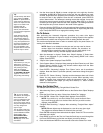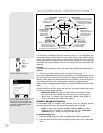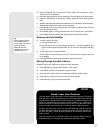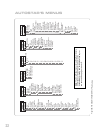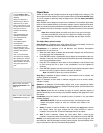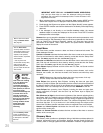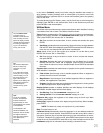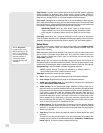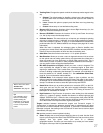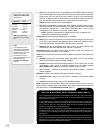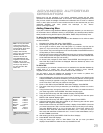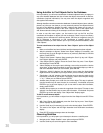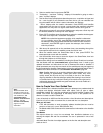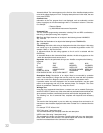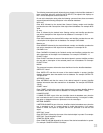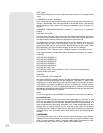
27
ܖ Tracking Rate: Changes the speed at which the telescope tracks targets in the
sky.
a.
Sidereal: The def
ault setting for AutoStar; sidereal rate is the standard rate
at which stars move from East to West across the sky due to the rotation of
the Ear
th.
b. Lunar: Choose this option to properly track the Moon over long observing
sessions.
c.
Custom: Allows entry of user-defined tracking rates.
ܖ Reverse L/R: Reverses the functions of the Left and Right Arrow keys (i.e., the
Right key moves the telescope to the left).
ܖ Reverse UP/DOWN: Reverses the functions of the Up and Down Arrow keys
(i.e., the Up key moves the telescope down).
ܖ Calibrate Sensors: This menu allows you to improve your telescope's pointing
accuracy to alignment stars. It calibrates to correct slight mechanical misalign-
ment due to transport, vibration, or aging. It is recommended that calibration be
performed after the LNT Module batteries are changed (see page 56 for more
information).
When this menu is selected, the telescope slews to Polaris. AutoStar then
prompts you to center Polaris and to press ENTER. AutoStar uses the position of
Polaris to fine tune the position of North and also for detecting level.
ܖ Quiet Slew: Sets the maximum slew rate to 1.5° for quieter operation.
ܖ Max Elevation: Allows you to enter a value in degrees that sets a limit as to how
far the optical tube can swing upward during a programmed slew. (Note that it
does not prevent you from performing a manual slew past this limit.) This is
useful when you have a camera or other peripheral attached to the telescope—
you can prevent it from striking the telescope base.
ܖ Min AOS (Acquisition of Signal): Allows you enter a value in degrees. This
value represents the altitude at which your telescope begins to slew when
acquiring a satellite track. This is useful when you are observing satellites, but a
tall tree or building is obstructing the telescope. For example, you might begin to
track the satellite at 15° altitude, instead of 5°. See
OBSERVING SATELLITES,
page 30, for more information about satellites.
ܖ Calibrate Motor: If the telescope motors appear to have a problem, use this
option to retest the motors before performing a Reset. This option is also used if
an A
utoStar unit is mo
ved between telescopes, to match AutoStar to the new tel-
escope. To calibrate the motors, select this option and press ENTER.
ܖ Smart Drive: Allows you to perform periodic error correction (PEC) on the R.A.
worm gear and can only be used with polar mounted telescopes. Must be
perf
or
med with a high po
wered reticle (
eg.
9mm
).
PEC
T
raining for the the ETX
telescopes will take about 24 minutes.
ܖ High Precision: If High Precision is tur
ned on, when looking for a faint celestial
object (
i.e., a nebula or galaxy), AutoStar first slews to a nearby bright star and
displays "ENTER to Sync." Center the star in the eyepiece, then press ENTER.
At that point the telescope has a high precision alignment to that par
t of the sky
and it then sle
ws to the object that w
as originally requested.
Targets switches between Astronomical targets and Terrestrial targets. If
"Astronomical" is selected, the telescope tr
ac
king motor is activated and any object
you observe will remain centered in the eyepiece. If "Terrestrial" is selected and the
telescope is aligned, the tracking motor is turned off. To learn how to track an object
automatically, see page 16.
Site provides access to several options including:
ܖ Select:
Displa
ys the currently selected obser
ving site or zip code
. Use the Scroll
k
e
ys to cycle through all the sites. Press ENTER when the site you wish to select
displays. Use this option when you move to a different
geographic location. The cities you have chosen or zip codes you have “added”
will appear at the top of this list (see
ADD belo
w).
Tip:
If the "ENTER to Sync"
feature is accessed by
mistake (holding the
ENTER key for more than
2 seconds), press MODE
to return to the previous
screen.
W
ant to lear
n more about
P
eriodic Err
or
Correction? See page 37.



